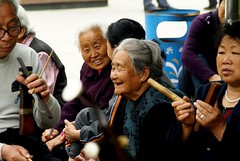By Kevin
Once again, we were an advertisement. In exchange for the use of one of the first 70 degree Spring afternoons of the year, we were giving the University "face." But that's not what we were told going in. All we were told was that there would be an activity (活动) in the afternoon involving sports. And that we must come and participate. There's no asking: when you are a student, the school often tells you what to do.
 |
| The cameraman we had to wait for before starting |
When we arrived with around 150 of the other foreign students on campus, the teacher in charge divided us into four rows of people and explained that we were going to be filmed by CCTV (China's national TV station) and the local
Ningxia TV station because Ning Da is participating in 留动中国 (meaning "stay active China," I think) -- an activity meant to promote "
healthy exercise" (redundant, I know), cultural exchange and "joining hands in the sun" for foreign students living in China. It sounds like participating schools were supposed to arrange 3-on-3 basketball tournaments, ping-pong matches and 毽子 (jianzi) (a sort of traditional Chinese hacky-sack) exhibitions, in addition to other cultural activities. While we waited for the videographer to show up, a reporter started making the rounds, interviewing several students, including our teammate about all sorts of things. I heard a few questions about food and studies and why he came to China. Nothing could start until the videographer was there.
 |
| 3-on-3 basketball "trials" |
It really came as no surprise that our sports activity, which the
school's website called "trials" for a national competition featuring foreign students didn't actually involve most of us doing something we wanted to do or really learning anything. After all, this was a made-for-TV event. Not an actual activity for our enjoyment or enrichment, no matter what the propaganda said. At the root, I figured it would be some sort of face-giving publicity stunt, no matter how much it had been dressed up as a fun outing. In fact, though we were told it would involve playing sports, very few were chosen to don University t-shirts and compete. The school chose six guys they'd heard could play basketball (two of them our teammates), gave them T-shirts and split them into two teams. The rest of us were just told to be there.
A handful of students played. The rest of us were the audience.
 |
| Foreign students holding signs |
We were supposed to simulate a "real" competition. The athletes would play their hearts out. The rest of us were told to 拉拉手, which I took to mean, be cheerleaders (the closest dictionary entry I could find to this says "to shake hands" -- either that or maybe I got the tones wrong and she meant 辣手, which means "troublesome" or "vicious" -- I'm guessing that none of these are what she was going for). We were to mimic the way Chinese students constantly cheer on their classmates at sports meets and basketball games , shouting the traditional Chinese cheer of “加油” (add oil! -- meaning something like "more effort" or "go team"). But few joined in. Most just watched. We just weren't naturals. Teachers repeatedly attempted to start a chant, but it would die before the third or fourth repetition. A few chanted cheers in Russian or other native languages. Students who were given an assignment to hold four signs reading 留动中国 held the signs with less and less enthusiasm as the game went on. The student tasked with holding up the 宁夏大学 sign tried to prop it up using a package of water bottles, then later by attaching it to another student's backpack.
 |
| Student shows off his prowess at jianzi, a Chinese hacky-sack-like game |
The basketball players played a fierce half-court game for 15-20 minutes, long enough for our teammate to get a bloody nose and hurt his knee. Then, as they finished their game, the teachers pointed the rest of us to the other end of the court and told us to watch and learn how to pay
毽子 (jianzi). In this game, which has been around since the fifth century, we all spent a few minutes attempting to use long-dormant or non-existent hacky-sack skills as we kicked around a shuttle-cock made from four brightly colored feathers attached to two or three small quarter-sized pieces of metal. A few students from Kyrgyzstan and Tajikistan had obviously played something similar before because soon they were jumping in the air, tapping the feathered hacky sack back and forth, showing off for the cameras. A teacher tried to get the rest of the students to gather around and again cheer them on for the cameras. By this time the crowd had shrunk to maybe 100 students. And half weren't interested in anything more than chatting with friends.
By the time we made it to the third activity, the ping-pong "tournament," only 50 or 60 students were left to crowd around the ping-pong tables in the classroom building. But still the cameras rolled.
 |
| Wang Hui, school director, interviewed by NXTV. |
In the end, I don't know if it had the desired effect. Perhaps if the competitions were real, rather than made-for-TV, people would have gotten into it. Perhaps if everything didn't feel so staged and manipulated it would have worked. But it didn't. It felt forced because it was. But maybe that's not how the school saw it. After all, the local news did run a report on the event, trimming out the fat and concentrating on the action and conveying the message the school was going for: "The primary (goal is) to offer our foreign students and Chinese university students a platform to interact and at the same time give them more opportunities to experience Chinese culture," said Wang Hui, the director of the School of International Education.
The only interaction we had with Chinese University students was with the three who served as referees of the basketball and ping pong matches. We probably could have gleaned the Chinese love for ping-pong or basketball without attending a staged event. The jianzi activity was interesting, but most of what I learned about Chinese culture came from reading
Wikipedia after learning that the sport isn't actually called "Chinese hacky-sack."
So I guess I learned two things - the importance of giving face and the name of the hacky-sack-like sport.Being the foreign faces in the crowd often gets us roped into events ostensibly for education's sake. But really it's all about giving face or publicity sake. We often go along with the publicity shoots because they "give face" to our hosts. "Face" is a huge thing in Chinese culture, so our hosts are generally more appreciative (at least when we were teachers they were -- as students, it's more of an expectation). Surely the school didn't gain as much face as it wanted. I wonder what we'll be roped into next.
 |
| Farmers work the fields at Ningxia University's experimental farm |
As students, we've been taken to a farm owned by the university so we could be photographed by
local media among the fields, we've given
New Year's performances for University and governmental leaders from China and several other countries and gone to teach Christmas lessons at a local university. As teachers, we've had colleagues and students ask if they could take our photo so they could advertise their school (even though we didn't work there), invite us to spend a day playing at the kindergarten (meaning teaching the kids some English songs), ask us to give high school students an impromptu English lesson and invite us to be interviewed for school radio programs, among other things. The difference between the two was that as students, we tend to be told to participate, whereas as teachers, it's a request. Often it's a very urgent request because they've already told others that we will participate, but at least it gets phrased as a request. We then must decipher how urgent it is.
But sometimes, as students, when told that we must participate, it's just not feasible: there was the 2-1/2-to-three-hour one way bus ride last Spring to Shapotou,
 |
| Shapotou, sand dunes along the Yellow River in Ningxia. |
a scenic sand dune along the Yellow River. I went alone. It was interesting, but the full-day trip just wouldn't have worked with then 1- and-a-half-year old Juliana skipping all naps. Then there was the 5K our first fall in Yinchuan. Students were told that they would be going to a small city an hour away, where there would be a 5K run. We were assured that we wouldn't have to run it if we didn't want to do so. We foreigners were also encouraged to bring our kids and assured that we wouldn't need a stroller. Thankfully, we declined the invitation, using the baby excuse. The bus dropped everyone off at the starting line, then drove to the finish line, forcing everyone to at least walk the route. Glad we decided not to go to that one. Carrying then 1-year-old Juliana for the whole route would have been terrible.
I can't help but wonder what the next face-giving event will be.

















